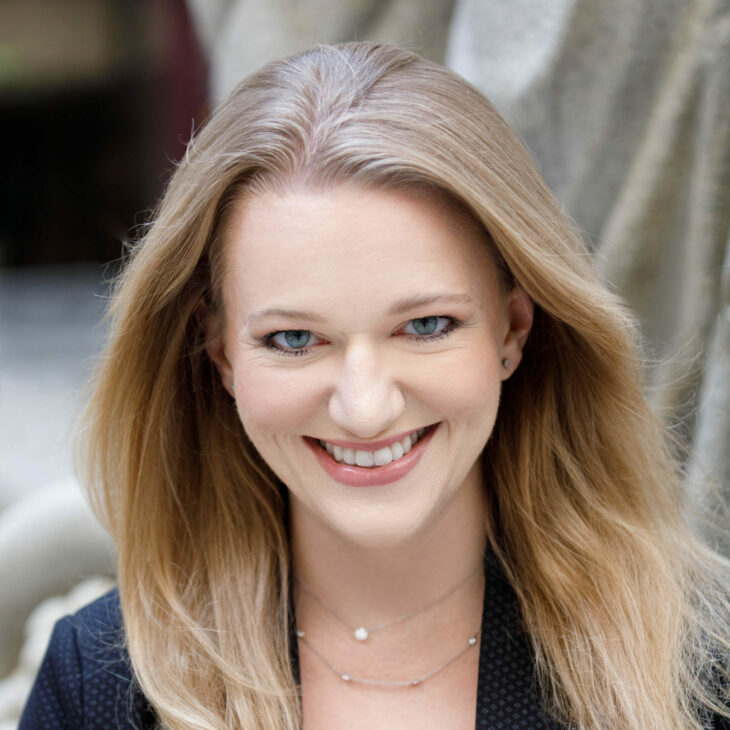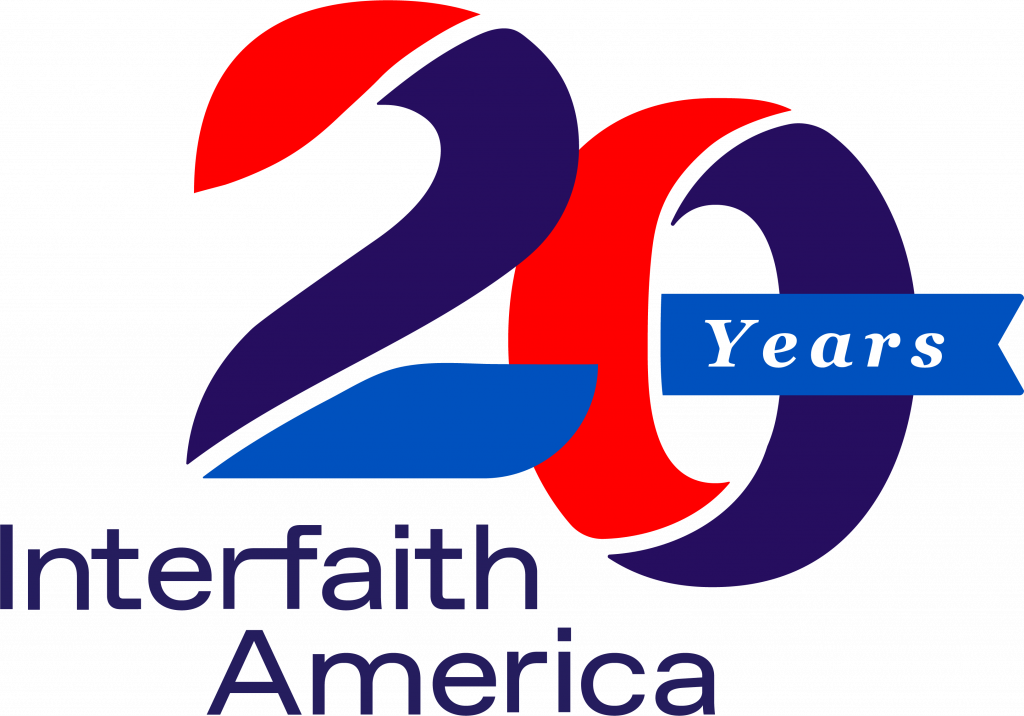
To mark the 20th anniversary of Interfaith America, we spoke with individuals connected to the organization about their own interfaith work, memories of Interfaith America, and their hopes for the future of interfaith cooperation.
Interfaith America Magazine’s Allie Vroegop interviewed Amber Hacker, Interfaith America’s Chief Operating Officer. She oversees a wide range of functions across the organization including accounting, technology, human resources, talent development, operations, environmental branding, and facilities, and has written for Harvard Business Review on the importance of accommodating religious diversity in the workplace. With her extensive knowledge of the organization over the last 15 years, Hacker shares about starting the Emerging Leaders program (formerly IFYC Alumni) and how her Christian faith inspires her to be an interfaith leader.
This conversation was lightly edited for length and clarity.

Allie Vroegop: How did you first get involved with interfaith work and Interfaith America?
Amber Hacker: I first got involved with the organization back in 2007. And it was for a very practical reason, which is that I needed a job! When I first found the organization and found the job posting, I was interested, but skeptical is how I would describe it. The concept of interfaith cooperation really intrigued me, but I was skeptical because I had the misconception that the organization was advocating theological pluralism, meaning that we’re all kind of the same, there’s different ways of going up the mountain, all paths are kind of similar. There are certainly some folks that believe that, and I have deep respect for those folks, but that’s not my particular viewpoint. I’m a Christian, and a committed Christian, and I have an exclusive truth claim. Faith is an important part of my life – growing up, anytime the doors were open at my local Baptist church, I was there. And so, when I first interviewed for the position, which was a receptionist position, I was really intrigued because I did my due diligence and looked at all the bios on the website. And I found this woman named April Kunze, who was an evangelical Christian. And I thought, what is an evangelical Christian doing working for an interfaith organization?
I walk into the interview, and the staff start doing something that I had never seen before in an interview, which was to tell their stories. And it was really powerful. April’s story — Eboo Patel tells her story in “Acts of Faith” — but basically, it’s about how she, as an evangelical Christian, in college was a leader of one of the local groups on campus. And an Imam reached out and said, “Our mosque suffered an arson attack, will you stand in solidarity with us?” And April said, “Yes, of course.” She did it because she said that’s what we’re called to do as Christians. She faced a lot of blowback for that decision, and ended up having stepped down from her leadership position. Eventually she comes to Chicago, meets Eboo and they start Interfaith Youth Core.
And April’s story so deeply resonated with me. I told her later, “April, when I interviewed for this job, I walked into that room wondering if you were really a Christian. I was really skeptical because you’re an evangelical working for an interfaith organization. I wasn’t quite sure what that’s about. And then I heard your story of standing up for another religious community – and doing so at great personal cost. I walked into this room wondering if you were really a Christian, but I walked out wondering if I was really a Christian.”
What April did? That’s what we’re called to do as Christians. If we look at the story of the Good Samaritan, it’s Jesus telling a parable that the religious group that you have the most issues with, that’s who you’re called to love. And you’re called to love your neighbor. He uses the term “agape,” which is used to describe the love that God has for us, for humanity. For me, that was such a powerful story and illustration of interfaith cooperation, which ultimately is about civic pluralism. Pluralism doesn’t mean that I have to water down who I am to come to the table with folks that are different from me. Understanding this difference between theological pluralism and civic pluralism – that was a huge lightbulb [moment] for me. April‘s powerful interfaith leadership led me to come to Interfaith America.
AV: What are you most proud of?
AH: I would say there’s a lot that I am proud of. One thing that comes to mind is our alumni, now known as our Emerging Leaders. I started the alumni program back in 2009-2010 when I was working on the program side, and I remember at that time we had a spreadsheet of 309 alumni. We knew that we needed to have some sort of program to provide resources and to network with our alumni to help them think about what it means to advance interfaith leadership wherever they were going beyond higher education.
There was a lot we didn’t know, but we knew that our alumni were awesome, and that we wanted to stay in touch with them. We wanted them to stay engaged, and [we knew] that they were an important part of our theory of change because they were the ones doing the — “social norming” – that was the term we used at the time. There were a lot of other people that had hands in building our alumni network. I’m just proud of where the Emerging Leaders [program] is today, and Hannah Willage has been a phenomenal leader of that program.
I led the program from probably 2009 to 2015, when I transitioned to the role that I have now. It really holds a dear place in my heart – I think our alumni are phenomenal. They are doing so many great things out in the world, and we’re just really lucky and blessed to have them part of our network. They are advancing interfaith leadership and interfaith work across professional spaces and sectors. I absolutely loved working closely with our alumni and having conversations about what does it mean to be a pastor and an interfaith leader? What does it mean to be an educator and an interfaith leader? What does it mean to work in the nonprofit sector and be an interfaith leader? And so, that’s something that I’m just proud of, that we created an alumni program over a decade ago and now we’re seeing these interfaith leaders out in the world, who are really making a tremendous impact. That’s not only something that I’m personally proud of, but also as an organization, collectively, we’re really proud of.
AV: What do you hope for the future for Interfaith America? Anything you want to see in the future?
AH: We all agree that we are in times that are highly polarized. I think our work, our theory, and our methodology have a lot to say about what it means to be a bridgebuilder and the importance of interfaith cooperation in this moment. I want to see the tent get bigger and bigger and bigger. We’ve spent the better part of a decade in higher education, and we’ve seen how that work has made an impact in that sector, and now I’m really excited to see what it means for interfaith work in corporate America as a sector. I’m really thrilled about [continuing the work in] the environment, racial equity, health, corporate America, and all these other different spaces.
My hope is that this idea of a potluck nation becomes sticky, because I just think that that is really beautiful, that we all have contributions to bring to the table. That paradigm is just so needed. Ultimately, we have something to say in this moment and there’s so much opportunity. In years past, we would have had conversations like, “We need to make the case for this work,” and right now, I don’t think we have to spend too much time making the case. But I am really excited for more and more people to understand what it means to be an interfaith leader, what it means to be a bridgebuilder, and how they can do that as leaders of institutions. Ultimately, it’s about how we can make our mission happen, which is inspiring, equipping, and connecting people in institutions to positively engage religious diversity. I’m really looking forward to what’s ahead for us and I’m excited for the tent to get bigger because we’ve got a lot of work to do.
Share
Related Articles
Interfaith Inspiration
Interfaith Inspiration



